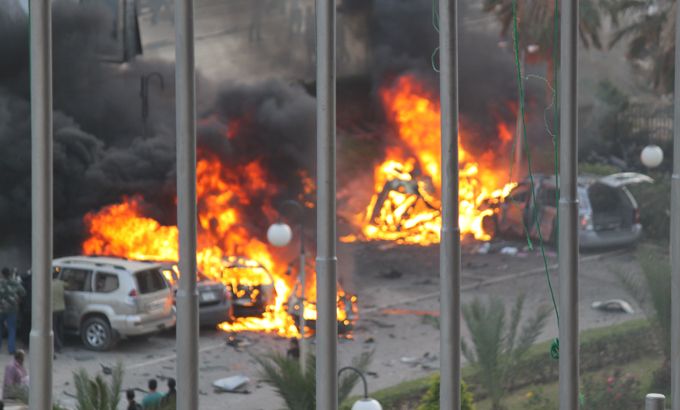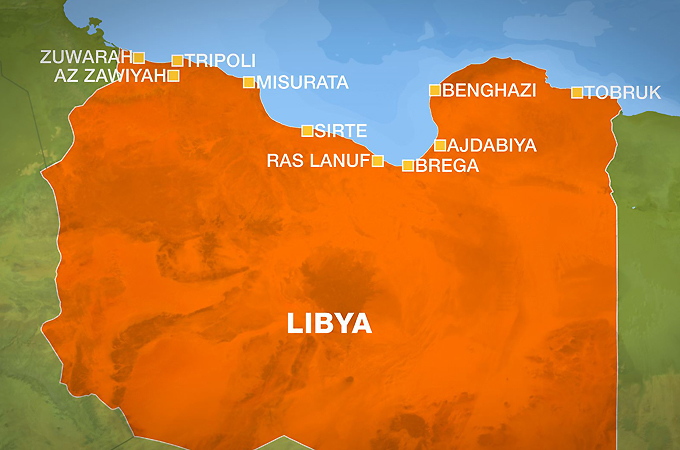Blast rocks hotel in Libya’s Benghazi
A car bomb has exploded near a hotel used by foreign diplomats in Libya’s rebel-held city of Benghazi.

A huge car bomb has rocked a major hotel in Benghazi, the Libyan rebels’ city in the east of the country, but caused no casualties, witnesses and police say.
Two cars were destroyed in the explosion, which occurred in the parking lot of the Tibesti hotel, used by rebel leaders, journalists and senior officials of the National Transitional Council (NTC), the main rebel administration in eastern Libya.
Hotel staff said there were no immediate reports of injuries and the cause of Wednesday’s blast was not clear.
A police officer said a bomb was detonated in one car and the blast damaged a second car parked next to it.
NTC members were holding a press conference there when the explosion occurred.
 |
Minutes after the blast a crowd of about 500 people gathered, waving flags of the rebellion, as a huge plume of black smoke billowed across the sky, witnesses said.
The explosion was the first act of violence in six weeks in the rebel stronghold.
Explosions were also heard in central Tripoli in the early hours of Thursday morning. Aircraft could be heard flying overhead but no further information was immediately available.
Libya’s rebel administration blamed Wednesday’s blast on forces loyal to Muammar Gaddafi.
“This act of terrorism shows, once again, the irresponsible and criminal nature of Gaddafi’s regime,” National Transitional Council (NTC) chairman, Abdul Jalil, said in a statement.
“No terrorist act can reverse the path towards freedom, democracy and human rights in Libya, which is chosen by the people of Libya and supported by the international community,” Jalil added.
“We will take all measures to bring perpetrators to justice and to ensure the safety and security of the Libyan people.”
‘Crimes against humanity’
On Wednesday, a UN inquiry accused Gaddafi’s regime of carrying out systematic attacks on the population, saying it committed war crimes and also crimes against humanity.
While it noted fewer reports of violations by the opposition, the commission of inquiry set up by the UN Human Rights Council also found that rebel forces committed acts that constituted war crimes.
“In accordance with its mandate to look also at crimes committed in Libya, the commission has … reached the conclusion that crimes against humanity and war crimes have been committed by the government forces of Libya,” said the commission in a statement.
“The commission received fewer reports of facts which would amount to the commission of international crimes by opposition forces, however did find some acts which would constitute war crimes,” it added.
The 47-member UN Human Rights Council had set up the investigation into suspected crimes against humanity in February after Gaddafi’s regime dispatched Libya’s army and air force to fire on civilians.
Investigators found evidence suggesting that Gaddafi’s forces “used excessive force against demonstrators, at least in the early days of the protests, leading to significant deaths and injuries,” it said.
In addition, the regime impeded access to hospitals, as well as carried out arbitrary detentions and torture.
“The commission has found that there have been acts … that were committed by government forces as part of a widespread or systematic attack against a civilian population with knowledge of the attack,” said the panel.
“Such acts fall within the meaning of ‘crimes against humanity’,” it noted.
NATO campaign ‘extended’
Meanwhile, NATO has agreed to extend its military campaign in Libya until late September, keeping up pressure on Gaddafi still in power after 10 weeks of air strikes.
Hours after NATO aircraft launched new raids on Wednesday morning on the Libyan capital, Tripoli, alliance ambassadors, meeting in Brussels decided to renew the mission for another 90 days.
This decision sends a clear message to the Gaddafi regime. We are determined to continue our operation to protect the people of Libya,” Anders Fogh Rasmussen, the NATO secretary-general, said.
“We will keep up the pressure to see it through,” Rasmussen added after the North Atlantic Council, the decision-making body of the 28-nation alliance, agreed to extend the mission. The current military mandate expires on June 27.
Rasmussen added that the departure of Gaddafi was only a matter of time.
 |
“The question is not if Gaddafi will go but when … It could take some time yet but it could also happen tomorrow.”
Wednesday’s decision will give individual nations time to prepare their contributions for the next 90 days, a NATO diplomat said.
The day’s events came a day after the Libyan government said that the air strikes had so far cost the lives of 718 civilians and wounded more than 4,000.
“Since March 19, and up to May 26, there have been 718 martyrs among civilians and 4,067 wounded – 433 of them seriously,” government spokesman Mussa Ibrahim said, citing health ministry numbers.
Ibrahim said these figures do not include Libyan military casualties, a toll the defence ministry refuses to divulge.
In its latest operational update, NATO said its key hits included a vehicle storage facility and three surface-to-air missile launchers in Tripoli, among similar targets in Brega, Hun, Misurata, Mizdah and Zawiya.
Ibrahim also denied that South African President Jacob Zuma, who met Gaddafi in Tripoli on Monday, had discussed an “exit strategy” with him.
Zuma “never discussed any exit strategies as they have been described in the media,” the spokesman said.
US concerned
Meanwhile, the United States said it had real concerns about weapons from Libya ending up in the hands of al-Qaeda.
“There is a very real concern for all the regional partners, and the United States shares this concern, about the proliferation of weapons from Libya to other places, including those under the control of al-Qaeda and others,” General Carter F Ham, commander of the US military’s Africa Command, told a news conference.
Libya’s neighbour Algeria has said it believes the chaos inside Libya, and the large quantities of weapons circulating there, is being exploited by al-Qaeda’s North African branch, al-Qaeda in the Islamic Maghreb (AQIM).
A senior Algerian security source told the Reuters news agency that convoys of pick-up trucks carrying weapons had been crossing the border from Libya to Niger, and from there to northern Mali where AQIM has bases in the desert.
“To control this proliferation of weapons will require the co-operative efforts of all involved and I have been encouraged to note the meetings that have occurred between Algeria, Mauritania, Mali and Niger,” Ham said.